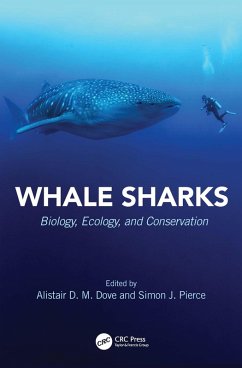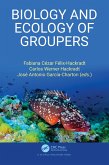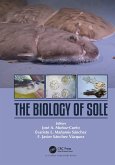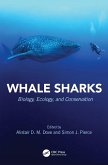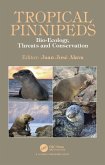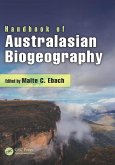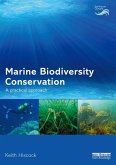Whale Sharks (eBook, PDF)
Biology, Ecology, and Conservation
Redaktion: Dove, Alistair D. M.; Pierce, Simon J.
62,95 €
62,95 €
inkl. MwSt.
Sofort per Download lieferbar

31 °P sammeln
62,95 €
Als Download kaufen

62,95 €
inkl. MwSt.
Sofort per Download lieferbar

31 °P sammeln
Jetzt verschenken
Alle Infos zum eBook verschenken
62,95 €
inkl. MwSt.
Sofort per Download lieferbar
Alle Infos zum eBook verschenken

31 °P sammeln
Whale Sharks (eBook, PDF)
Biology, Ecology, and Conservation
Redaktion: Dove, Alistair D. M.; Pierce, Simon J.
- Format: PDF
- Merkliste
- Auf die Merkliste
- Bewerten Bewerten
- Teilen
- Produkt teilen
- Produkterinnerung
- Produkterinnerung

Bitte loggen Sie sich zunächst in Ihr Kundenkonto ein oder registrieren Sie sich bei
bücher.de, um das eBook-Abo tolino select nutzen zu können.
Hier können Sie sich einloggen
Hier können Sie sich einloggen
Sie sind bereits eingeloggt. Klicken Sie auf 2. tolino select Abo, um fortzufahren.

Bitte loggen Sie sich zunächst in Ihr Kundenkonto ein oder registrieren Sie sich bei bücher.de, um das eBook-Abo tolino select nutzen zu können.
Written by the world's leading experts in whale shark biology, ecology, and conservation, this book is the first definitive volume about the world's biggest fish.
- Geräte: PC
- mit Kopierschutz
- eBook Hilfe
Andere Kunden interessierten sich auch für
![Biology and Ecology of Groupers (eBook, PDF) Biology and Ecology of Groupers (eBook, PDF)]() Biology and Ecology of Groupers (eBook, PDF)60,95 €
Biology and Ecology of Groupers (eBook, PDF)60,95 €![The Biology of Sole (eBook, PDF) The Biology of Sole (eBook, PDF)]() The Biology of Sole (eBook, PDF)49,95 €
The Biology of Sole (eBook, PDF)49,95 €![Whale Sharks (eBook, ePUB) Whale Sharks (eBook, ePUB)]() Whale Sharks (eBook, ePUB)62,95 €
Whale Sharks (eBook, ePUB)62,95 €![Tropical Pinnipeds (eBook, PDF) Tropical Pinnipeds (eBook, PDF)]() Tropical Pinnipeds (eBook, PDF)49,95 €
Tropical Pinnipeds (eBook, PDF)49,95 €![Red Snapper Biology in a Changing World (eBook, PDF) Red Snapper Biology in a Changing World (eBook, PDF)]() Red Snapper Biology in a Changing World (eBook, PDF)49,95 €
Red Snapper Biology in a Changing World (eBook, PDF)49,95 €![Handbook of Australasian Biogeography (eBook, PDF) Handbook of Australasian Biogeography (eBook, PDF)]() Handbook of Australasian Biogeography (eBook, PDF)49,95 €
Handbook of Australasian Biogeography (eBook, PDF)49,95 €![Marine Biodiversity Conservation (eBook, PDF) Marine Biodiversity Conservation (eBook, PDF)]() Keith HiscockMarine Biodiversity Conservation (eBook, PDF)58,95 €
Keith HiscockMarine Biodiversity Conservation (eBook, PDF)58,95 €-
-
-
Written by the world's leading experts in whale shark biology, ecology, and conservation, this book is the first definitive volume about the world's biggest fish.
Dieser Download kann aus rechtlichen Gründen nur mit Rechnungsadresse in A, B, BG, CY, CZ, D, DK, EW, E, FIN, F, GR, HR, H, IRL, I, LT, L, LR, M, NL, PL, P, R, S, SLO, SK ausgeliefert werden.
Produktdetails
- Produktdetails
- Verlag: Taylor & Francis eBooks
- Seitenzahl: 344
- Erscheinungstermin: 25. August 2021
- Englisch
- ISBN-13: 9781351334761
- Artikelnr.: 62413050
- Verlag: Taylor & Francis eBooks
- Seitenzahl: 344
- Erscheinungstermin: 25. August 2021
- Englisch
- ISBN-13: 9781351334761
- Artikelnr.: 62413050
- Herstellerkennzeichnung Die Herstellerinformationen sind derzeit nicht verfügbar.
Alistair D.M. Dove Ph.D. is a broadly trained marine biologist and currently Vice President of Science and Education at Georgia Aquarium in Atlanta, USA, where he oversees international research programs on whale sharks, manta rays, coral reefs, sharks and dolphins. Alistair graduated from the University of Queensland in Brisbane, Australia with a B.Sc. Honours first class in 1995 and a Ph.D. in Microbiology and Parasitology in 1999, for which he was awarded a University Medal and Dean's List commendation. His early research focus was on parasites and diseases in freshwater and marine environments, but after a period studying diseases of lobsters, he began focusing on the biology and ecology of whale sharks after moving to Georgia Aquarium in 2006. Simon J. Pierce Ph.D. is a co-founder and Principal Scientist at the Marine Megafauna Foundation, where he leads the global whale shark research and conservation program. Simon is also a Co-Chair for the Sub-Equatorial Africa region within the IUCN Shark Specialist Group, a Science Advisor to the Wildbook for Whale Sharks global database, and a founding board member of the Sawfish Conservation Society. Simon holds a BSc in Ecology from Victoria University of Wellington in New Zealand, and a BSc (Hons, 1st Class) and doctoral degree in marine biology from The University of Queensland in Brisbane, Australia. Simon began working with whale sharks in Mozambique in 2005, and now leads or collaborates on conservation biology and population ecology research programs across the world.
Introduction. 1. How and why is the whale shark the world's largest fish?
2. Whale shark reproduction, growth, and demography 3. Whale shark sensory
biology and neuroanatomy 4. Parasites and other associates of whale sharks
5. Population genetic structure of whale sharks 6. Whale shark movements
and migrations 7. Population ecology of whale sharks 8. Whale shark
foraging, feeding, and diet 9. Lessons from care of whale sharks in public
aquariums 10. Whale shark tourism as an incentive-based conservation
approach 11. Global threats to whale sharks 12. Conservation of whale
sharks 13. Outstanding questions in whale shark research and conservation.
2. Whale shark reproduction, growth, and demography 3. Whale shark sensory
biology and neuroanatomy 4. Parasites and other associates of whale sharks
5. Population genetic structure of whale sharks 6. Whale shark movements
and migrations 7. Population ecology of whale sharks 8. Whale shark
foraging, feeding, and diet 9. Lessons from care of whale sharks in public
aquariums 10. Whale shark tourism as an incentive-based conservation
approach 11. Global threats to whale sharks 12. Conservation of whale
sharks 13. Outstanding questions in whale shark research and conservation.
Introduction. 1. How and why is the whale shark the world's largest fish?
2. Whale shark reproduction, growth, and demography 3. Whale shark sensory
biology and neuroanatomy 4. Parasites and other associates of whale sharks
5. Population genetic structure of whale sharks 6. Whale shark movements
and migrations 7. Population ecology of whale sharks 8. Whale shark
foraging, feeding, and diet 9. Lessons from care of whale sharks in public
aquariums 10. Whale shark tourism as an incentive-based conservation
approach 11. Global threats to whale sharks 12. Conservation of whale
sharks 13. Outstanding questions in whale shark research and conservation.
2. Whale shark reproduction, growth, and demography 3. Whale shark sensory
biology and neuroanatomy 4. Parasites and other associates of whale sharks
5. Population genetic structure of whale sharks 6. Whale shark movements
and migrations 7. Population ecology of whale sharks 8. Whale shark
foraging, feeding, and diet 9. Lessons from care of whale sharks in public
aquariums 10. Whale shark tourism as an incentive-based conservation
approach 11. Global threats to whale sharks 12. Conservation of whale
sharks 13. Outstanding questions in whale shark research and conservation.
